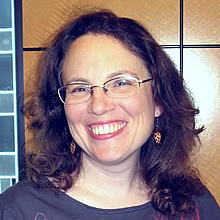Nearly three years ago, a photo of an albatross chick changed Beth Terry's life. The bird's stomach had exploded from eating disposable plastic bottle caps and additional plastic waste. It motivated Beth to see if it would be possible to live a life with less plastic, if not plastic free. Her blog, Fake Plastic Fish, started as a diary of her attempts to find plastic alternatives, and has now become a resource for people trying to live a plastic-free life.
Beth is in my kitchen today talking about the chemicals that remain in many organic foods, a grown-up version of her mom's creamy casserole, and how her research has changed her life.

Why is living organic important to you?
It's important for me to eat organic food because I am aware of the chemicals in foods from pesticides and hormones, and I also know they are very harmful to the environment and to farm workers. I don't want to contribute to that.
Through my research, I started to wonder how chemical-free organic food is if it's surrounded by plastic. That plastic can contain some of the same hormone disruptors that we're trying to avoid in organic food in the first place. Consumers don't have any idea what chemicals are in the plastic because no one is responsible for sharing that info. If we don't know what it is, how do we know it's safe?
There's nothing that's perfect, but I eat fresh fruits and vegetables as much as I can. I do a lot of shopping from bulk bins, where I bring my own containers and fill up on grains, rice, and beans. Although some of those things are shipped in giant plastic bags, there's less waste in a huge bag than in everyone buying individual sizes. But plastic is ubiquitous; it's hard to get it all out.
What was your favorite food growing up?
My mom's tuna casserole, made with Campbell's Cream of Mushroom soup, canned tuna, and American cheese. It's warm, creamy, gooey and comforting.
What's your go-to comfort food now?
Homemade risotto--all the warm and creamy goodness of my favorite food growing up but without the packaged ingredients. The rice and olive oil come from bulk bins in my own containers, and everything else is organic and plastic-free. It takes a long time to make, but it's the most meditative, calming activity. It feels like such a treat when I allow myself that time to make it.
What's the one thing in your kitchen you just couldn't live without?
Mason jars. I store everything in them. I fill them with food from bulk bins at the store, store dry food in them in cupboards, and freeze them with stuff. (As long as you don't fill them up all the way, leave room for expansion, and thaw them slowly, they won't explode.) I have lots of different sizes of jars, from pickle to jam size, so we save them and constantly use them.
What magazine, website, book, album, or product are you most obsessed with right now?
I'm probably on Google the most because I'm always researching. I'm also kind of obsessed with Facebook. My Plastic Crap Wall of Shame page on Facebook has become a collection of unnecessary, overpackaged, single-use, single-purpose, single-size plastic crap. Someone posted a photo of individually packaged ice cubes recently called Ice Rocks. It's actually sold in stores, on shelves, water in plastic wrap that you freeze at home--it's the most unbelievable thing. It makes me laugh because it's ridiculous, but it makes me cry because it's real!
I'm also obsessed with the book Eating Animals; it totally turned me into a vegetarian. It completely changed me. I'll smell something and it will smell good, and I'll look at it and realize it's meat and then, it won't smell good to me anymore. There are images and scenes that he describes in that book about animal treatment. I thought I had heard it all, but the way he describes it, it's relentless.
What's the most important news story today that you think we all need to pay more attention to?
I think the problem with plastic is really coming into people's awareness now. There have been stories in Time, The New York Times, and CNN. Even Captain Moore, who discovered the Pacific Garbage Patch, had a spread in Rolling Stone.
Everyone is concerned about BPA and PVC. Parents are concerned about what their kids are being exposed to. There's not enough good information, but there is a lot of media attention. There's a lot of sensationalized news about plastic, but people don't know what to believe.
It's like that with a lot of environmental news: We hear the bad news but we don't hear what you can do besides signing these letters or giving money. I don't think making personal changes individually is enough to solve the problem, but I also don't think we will solve the problem if we don't start with ourselves. Taking personal responsibility is the first step. It was for me and for the people who read my blog.
Where do you get your news?
I'm not the kind of person who looks at one to two news sources regularly, but I listen to NPR and I'm on some list servers for various groups. I actually spend a lot of time researching the stories that are sent to me. I find that a lot of times the stories in the newspaper or on Yahoo don't give enough information, they just give the main idea. But if they mention the study and I'll go online and find the story and I'll try to understand it and share that information with my readers. That's the kind of blogger I want to be.
Related Links:
Make Mine Organic - Maria's Farm Country Kitchen
Keep Your Garden Plastic-Free With These Easy Swaps - Rodale.com
Fake Plastic Fish
For more from Maria Rodale, go to www.mariasfarmcountrykitchen.com.
